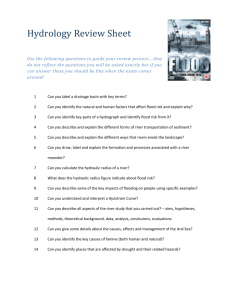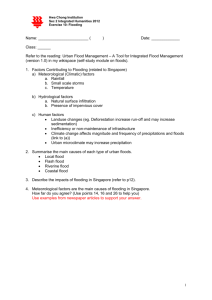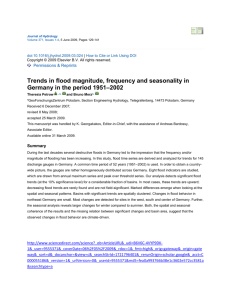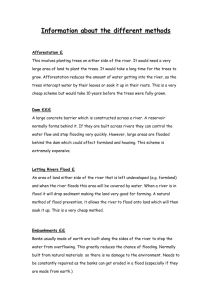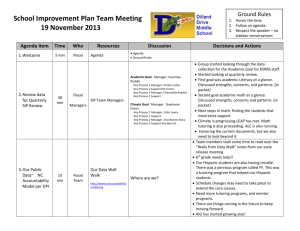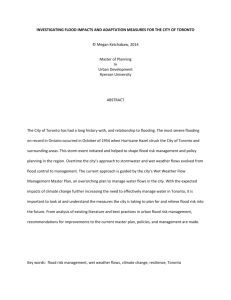Flood Recovery Information For Food Businesses
advertisement
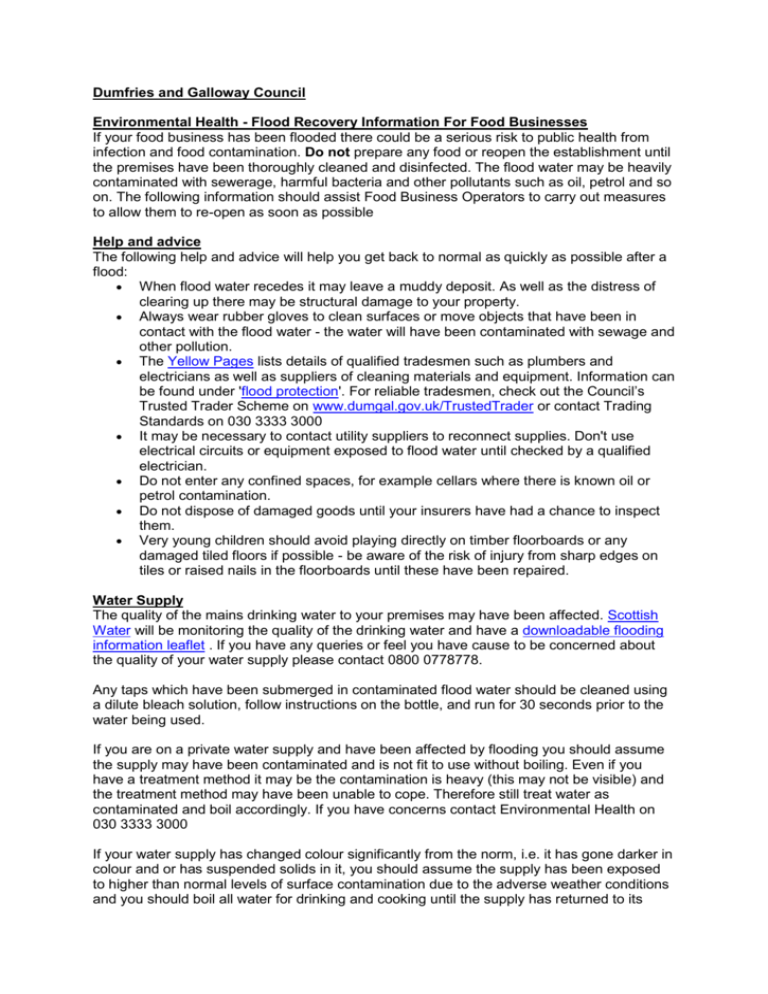
Dumfries and Galloway Council Environmental Health - Flood Recovery Information For Food Businesses If your food business has been flooded there could be a serious risk to public health from infection and food contamination. Do not prepare any food or reopen the establishment until the premises have been thoroughly cleaned and disinfected. The flood water may be heavily contaminated with sewerage, harmful bacteria and other pollutants such as oil, petrol and so on. The following information should assist Food Business Operators to carry out measures to allow them to re-open as soon as possible Help and advice The following help and advice will help you get back to normal as quickly as possible after a flood: When flood water recedes it may leave a muddy deposit. As well as the distress of clearing up there may be structural damage to your property. Always wear rubber gloves to clean surfaces or move objects that have been in contact with the flood water - the water will have been contaminated with sewage and other pollution. The Yellow Pages lists details of qualified tradesmen such as plumbers and electricians as well as suppliers of cleaning materials and equipment. Information can be found under 'flood protection'. For reliable tradesmen, check out the Council’s Trusted Trader Scheme on www.dumgal.gov.uk/TrustedTrader or contact Trading Standards on 030 3333 3000 It may be necessary to contact utility suppliers to reconnect supplies. Don't use electrical circuits or equipment exposed to flood water until checked by a qualified electrician. Do not enter any confined spaces, for example cellars where there is known oil or petrol contamination. Do not dispose of damaged goods until your insurers have had a chance to inspect them. Very young children should avoid playing directly on timber floorboards or any damaged tiled floors if possible - be aware of the risk of injury from sharp edges on tiles or raised nails in the floorboards until these have been repaired. Water Supply The quality of the mains drinking water to your premises may have been affected. Scottish Water will be monitoring the quality of the drinking water and have a downloadable flooding information leaflet . If you have any queries or feel you have cause to be concerned about the quality of your water supply please contact 0800 0778778. Any taps which have been submerged in contaminated flood water should be cleaned using a dilute bleach solution, follow instructions on the bottle, and run for 30 seconds prior to the water being used. If you are on a private water supply and have been affected by flooding you should assume the supply may have been contaminated and is not fit to use without boiling. Even if you have a treatment method it may be the contamination is heavy (this may not be visible) and the treatment method may have been unable to cope. Therefore still treat water as contaminated and boil accordingly. If you have concerns contact Environmental Health on 030 3333 3000 If your water supply has changed colour significantly from the norm, i.e. it has gone darker in colour and or has suspended solids in it, you should assume the supply has been exposed to higher than normal levels of surface contamination due to the adverse weather conditions and you should boil all water for drinking and cooking until the supply has returned to its normal colour. If you have disinfection such as Ultra Violet or another form of disinfection do not assume the supply is safe even if coloured, as in exceptional conditions, any equipment can be compromised. If in any doubt seek advice from your installer or the manufacturer. Cleaning up after the flood Do not re-enter your premises until all flood water has been removed. Scottish Fire and Rescue Service may be able to help you with pumping water out of your house. Please remember others may also need this help so you may have to wait your turn and there is no point pumping out rising water as it will come straight back into the property. Ventilate your building after flooding - less damp is less damage. Put on protective clothing before starting any clean up. Wash your hands thoroughly after handling anything that may be contaminated and ideally use hot soapy water and liquid antibacterial soap. Clean all hard surfaces - food preparation areas, surfaces, equipment, glasses, crockery, food containers, beer-lines and optics - with hot soapy water several times until visually clean, followed by washing down with a food safe disinfectant, (disinfectant or sanitiser that meets British Standard EN 1276:1997 or British Standard EN 13697:2001, this information should be found on the label of the product), adhering to manufacturers' directions. Heavily contaminated items should be disposed of. All food that may have been contaminated must be destroyed. Initially this must be double bagged and ideally placed in a sealed container to prevent attracting pests. Where canned and unopened packaged foods have been in contact with flood water, they should be disposed of. Wooden beer casks which have been in contact at all with flood waters must be discarded. Metal beer barrels may be able to be used as long as the flood water has not reached any connected outlet or inlet. Advise your suppliers, on returning any contaminated barrels, casks and so on, that they have been in contact with flood waters so they can take the necessary precautions. If you become ill or suffer any gastric symptoms following the clean-up please visit your GP as soon as possible. Nobody should handle or prepare food if they are suffering from gastric illness, such as diarrhoea and vomiting. In cases of food loss check with your insurance company. If required we can issue a 'voluntary surrender certificate' to help with your insurance claim. There will be a charge for this. Contact Environmental Health on 030 333 3000 for further information. Seek advice from us on clearing up if you have any doubts about it. Seek professional advice (structural engineer or building control service) if your property is damaged. Power cuts If you have suffered from power cuts, including for example when electric supplies are cut off on a rolling programme to help conserve energy, you should have regard to the following advice: High risk food (such as meat, fish, dairy, egg and rice products) must be kept at or below 5°C to prevent the growth of harmful bacteria. Discard any perishable food which has not been kept at fridge temperature. If the temperature of high risk foods begins to rise above 5°C then if possible use it immediately or arrange for disposal. Provided doors are kept closed food should remain frozen in disconnected freezers for up to 24 hours. If food has defrosted it should be safe if treated as chilled food, refrigerated and used up within a couple of days. Try to avoid opening refrigerator/freezer doors when the power is off. The temperature of an open fridge rises very quickly. Electrical Safety Electrical equipment and installations can pose serious safety risks if they have been damaged by flood water. Make sure the property is safe before you enter Try to avoid direct contact with any water which remains. It may be contaminated Have a torch at hand when entering the property Switch off the electricity supply at the fuse box, if it is safe to do so. If there is evidence of water inside the fuse box or if there are signs of arcing or overheating, seek professional advice Unplug damaged electrical appliances and move all portable ones away from the area affected by flooding Arrange for other services, such as gas, to be switched off. Electricity and gas supplies should not be turned back on until you have had professional advice that it is safe to do so. Do not attempt any electrical repairs or connection of temporary supplies yourself – always use a registered electrician Arrange for a periodic inspection and test to be carried out on the property. The registered electrician will issue you with an Electrical Installation Condition Report (EICR) which will identify the condition of the wiring and equipment in need of repair All of the portable appliances affected by the flood will need to be tested to make sure that they are safe for continued use, as well as fixed equipment such as electric cookers. If the water damage to electrics is relatively minor and caused by clean water, i.e. a burst water pipe or tank, then it is likely that the registered electrician will just need to dry out cables and replace any accessories affected by the water (sockets, switches, plugs etc.) If there is major flood damage to the electrics caused by clean or contaminated water, then it is likely that parts of the electrical installation will need to be rewired When rewiring is necessary, ask the registered electrician about the possibility of raising the height of the newly installed electrical equipment, including raising the fuse box and sockets to above any future expected flood level. Gas Safety Gas equipment and gas installations can pose safety risks if damaged by flood water. If possible turn off the gas control valve. Ensure all gas appliances are turned off to minimise the possibility of water getting into the supply pipes. It is important to have the appliances inspected by a GAS SAFE registered engineer before being put back into use. The appliances may look and appear to be working normally, but the flue or ventilation systems essential for normal operation may have been adversely affected by floodwater. Guidance on Disposal of Waste Contact your insurer in the first instance, to ensure you are taking the appropriate and correct steps for dealing with any flood damaged waste under your specific policy conditions (it is likely your insurer will need to see the damage, waste food and equipment before it is taken away). The insurer should also provide advice on what you should do with the waste. If there is a delay in your insurer being able to visit and food waste needs to be removed to avoid it becoming a public health concern, your insurer may be agreeable to an Environmental Health Officer visiting your premises to see the waste and then providing you with a Certificate that broadly lists the food waste. You should also take photos of the waste. Please note that it is up to the food business operator to liaise with their insurer to determine whether this approach is acceptable to them for claim purposes and to receive advice from the insurer about what to do with the waste. There will be a charge if you request a Certificate from Environmental Health. Where a business has commercial arrangements in place for the collection of their waste, they are advised to contact their existing waste management provider for advice and support. If they use the Council Service then they should contact them on 030 3333 3000 to discuss disposal arrangements for anything above and beyond what can go in the normal bins or bags, any additional expense incurred should be reclaimable on your insurance. You should however, check with your insurer first, as they may have specific requirements in relation to disposal. Rodent Infestations The flood water may have disturbed rodents which could have entered your premises and caused damage to electrical wiring and furniture. If there is a problem, a pest control contractor should be engaged. This is a service that can be provided, for a small charge, by telephoning Environmental Health on 030 3333 3000. Reopening of a Food Premises If you have followed the above advice and addressed all areas of concern then there will be no reason why your food business should not re-open. If however you have concerns and wish to discuss any matter then please contact Environmental Health on 030 3333 3000. For further information: Contact: Environmental Health Email: EnvironmentalStandards@dumgal.gov.uk Telephone: 030 3333 3000 Fax: 01387 245972 Address: Environmental Health, Municipal Chambers, Buccleuch Street, Dumfries, DG1 2AD or Environmental Health, Ailsa House, Sun Street, Stranraer, DG9 7JL

